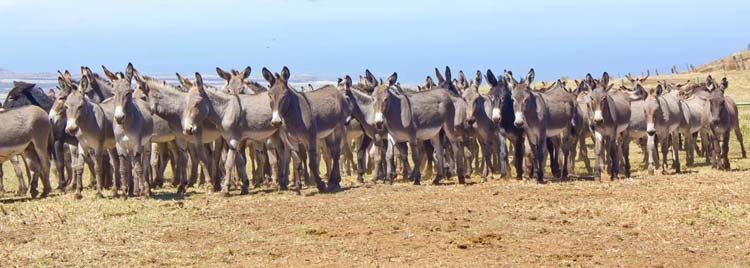












Waikoloa Nightingales |
|||
 |
|||
| Who, What, Where, When, and Why... | |||
Locally, they began adopting out the donkeys, but only after the animals had been sterilized and matched with the best-suited adopters. More than 250 donkeys have been humanely captured, sterilized, and adopted to date, largely thanks to Bergin with another 50-100 awaiting adoption in Kamuela and Hilo areas. Local rancher Stan Botielho, Malama Waikoloa Nightingales founder Anika Glass and CB Horse Rescue founder Bird McIver contributed greatly to the effort's success in addition to dozens of compassionate residents all deeply concerned about the welfare of these donkeys. Fast Forward to September 16, 2011. In Waiki'i Ranch 119 donkeys were being readied for relocation to Peaceful Valley Donkey Rescue in Tehachapi, California. Early morning finds a dozen trucks hooked up to large multi-compartment horse trailers. The donkeys will be put six to a crate in the custom 747 so to make it easier they are put six to each trailer compartment. Ready to load the donkeys, word comes that the jet is an hour late arriving and it's felt best to wait an hour so the animals aren't stuck in trailers longer than necessary. All systems are go and the loading begins, slowly at first but soon a rhythm develops and trailer after trailer is filled almost as fast as they are backed in. Sooner than I believed possible we're done, a dozen trucks and trailers are making the hour long 45 mile drive to the Kailua-Kona airport by way of the “Belt Road” (Highway 19, so called as it circles the island like a belt) with 30 miles of beautiful Hawaiian coast. Arriving at the airport, the drivers line the trailers up with amazing precision, waiting for the crates to arrive. The 20 welded aluminium crates are brought out by tractors two to three crates at a time, six 500-800 pound donkeys is a lot of weight per crate. By the time the crates finally arrive (another delay) the poor donkeys are tired, confused, and scared, most having never been within a quarter mile of a human. The crates are aligned with the trailer, locks are released and the crate is pushed tight against the trailer making animal transfer easy, at least in theory. The crate door is closed and the crate is slid back, locked in place on the trailer and the next crate is moved into position. The last crate door slammed shut and the crate was taken away just in time for a beautiful Hawaiian sunset, the last these donkeys will ever see. When the sun rose Saturday morning these 119 donkeys were treated to their first California sun rise and, while they probably didn't spend a lot of time thinking about it, the first day of the rest of their long lives. Please Note: A portion of each sale will be donated to care for the Waikoloa Nightingales! Randy C. Horne Please CLEARLY PRINT the address you would like your DVD(s) shipped to and allow 7-10 days. |
|||
Note: All Images And Stories On This Site Are Copywrited. Use Of Any |
|||
 Great Pricing & Selection of Cameras and Accessories: Top Camera Mall |
|||
|
|||
